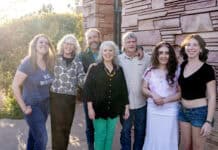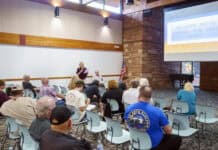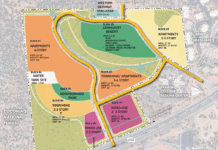The life and career of Russell Means has many branches.
And while his interests and activities may be broad and varied, his principles are steadfast and consistent.
Freedom and fairness is all we are looking for, Means said more than once.
Larson Newspapers
________________
The life and career of Russell Means has many branches.
And while his interests and activities may be broad and varied, his principles are steadfast and consistent.
Freedom and fairness is all we are looking for, Means said more than once.
In preparation for his presentation at the Four Directions Wisdom Gathering, at the Sedona Creative Life Center on May 19, Means discussed the many issues facing the environment and the American Indian today.
“Free to be human, free to travel, free to stop, free to trade where they choose, free to choose their own teachers, free to follow the religion of their fathers, free to talk, think and act for themselves,” Means stated on his Web site, quoting Chief Joseph, leader of the Nez Perce Indians in the late 19th century.
During breakfast, it was at first a walk down memory lane for Means. He has been coming to Sedona since 1988 to visit friends and marched in Page in the 1970s to protest racial issues in the school there.
He belongs to the Oglala Sioux — the Oglala Lakota in their language — and is married to a Navajo woman from the New Mexico part of the Navajo Nation.
Means is from the Pine Ridge Indian Reservation, the location of a 71-day standoff with the federal government in 1973.
His Oglala name is Oyate Wacinyapi or “works for the people.”
“‘Native American’ is a government term. I reject it,” Means said.
Means said the term was given to the indigenous people he represents by the deputy secretary of the interior in 1970 to identify American Indian prisoners easily and with a single term.
“When I go to Hawaii, there, I am an American Indian. They are native Americans.
“I prefer the term ‘American Indian’ because I know where it comes from,” he said.
“Whenever a government uses the term ‘native’ or ‘tribal,’ it’s to reduce your freedom,” he said.
It means they do not have to treat you as a people, as a nation, he said.
Since treaties and other legal documents state “Indian” and not “Native American,” Means believes use of the term “American Indian” can help today’s people have a stronger position in legal proceedings.
The word “Indian” is from the Italian term “indios” and means “one with god,” Means contends.
Spanish conquerors, Means said, upon meeting Central American Indians for the first time, told their superiors, “They are so generous, humble and peaceful, they would make excellent slaves.”
“Now, the Catholic Church back in Europe at the time would not allow taking of humans as slaves. So they had to prove we were not human, he said.”
Therefore, they said, “Anyone so generous, humble and peaceful with no love or property, they can’t be human beings,” Means said.
“I could never understand how matriarchal societies, which most indigenous people are, could allow cannibalism. They wouldn’t. So I went to find out for myself,” Means said.
Means went to Mexico and talked to the descendants of the early inhabitants. He found that in Mexico City, native people were performing surgery, including open-heart surgery, in the cleanest, germ-free air possible, which was at the top of the pyramids they built.
“The European conquerors reported to the church this activity as human sacrifices to thus further proving the non-human status of American Indians and paving the way for centuries of inhuman treatment,” Means said.
The inroads of Christianity meant the denial of native religious practice and the beginning of the loss of cultural identity, Means said.
“I want to go back to meet the first woman in that first village who began to believe in Christianity. She had to be the village idiot,” Means said.
Citing the denial of full citizenship until 1935 and voting issues in Indian country, including that Navajo were subject to the Arizona version of Jim Crow laws until 1968 and were rarely allowed to vote until then, Means said much has changed but several issues remain.
“The United States government will never have an effective foreign policy until it deals justly with the American Indians,” Means stated on his Web site.
Means responded as if he had been asked many times about the American Indian Movement.
“AIM was the vanguard for Indian rights. AIM was born because so-called Native Americans wanted self-determination. AIM did its job,” Means said.
“There were virtually no advocates for Indian rights in the 1960s. You had the fishing struggle in the Northwest, you had the land struggle in Northern California, you had the land, spiritual, race struggles in New York State with the Six Nations Iroquois, but nothing national,” he said.
“By the mid 1980s, it was over. We did our job and started fading away,” Means said.
“The typical success of colonialism or patriarchal dominance is that once you realize you can have no power within them, you start fighting among yourselves,” he said.
Movie Career
Russell Means has been in 20 movies in 17 years.
His most famous was his first, “The Last of the Mohicans.”
Means played Chingachgook, the fictional character of the title and was billed as second male lead after Daniel Day-Lewis.
His credits also include “Buffalo Girls,” “Natural Born Killers,” “Into the West” and he did the voiceover in “Pocahontas” as the title character’s father.
His autobiography, Where White Men Fear to Tread, is currently on its 11th printing.
Environment
“They have proved the Earth is a living organism,” Means said.
“How can we treat this living thing, the thing we call Grandmother Earth, so bad?”
He said Sedona should follow the examples of Santa Fe, N.M., and some communities in New Hampshire where growth has been stopped and economies are still viable.
Means received a standing ovation after his presentation at the Sedona Creative Life Center on Saturday, May 19.
The Four Directions Conference had its closing ceremony at Red Rock State Park. Means was drawn into the center of the circle of attendees. He removed his shoes and socks in order to be in contact with the Earth.
He chanted about our “responsibility to the Earth.”
At breakfast the day before, Means said, “If you can’t preserve this,” his arm sweeping to indicate the Sedona landscape, “There is no hope for the world.”



















